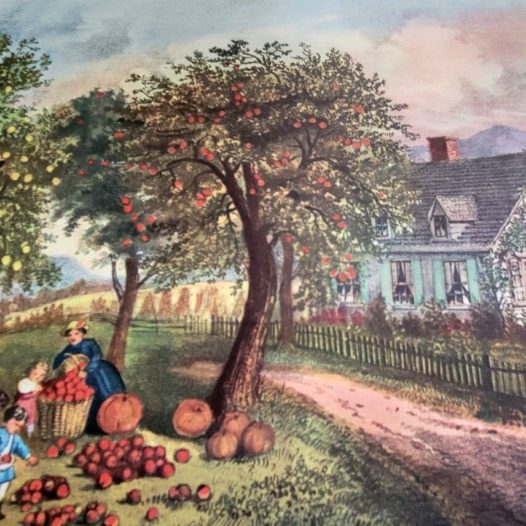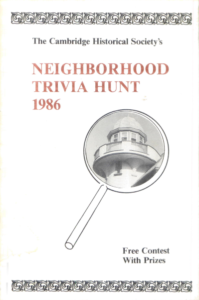
Cambridgeport Apple Fest has hands-on history April 26 as partners with Farmers to You group
Above image: “Family Picking Apples,” Currier and Ives, 1870. (Image: The New England Historical Society)
By Beth Folsom
In previous centuries, much of Cambridge was agricultural land, including apple orchards. English settlers planted their first apple orchard in 1623 on the land of the Massachusett tribe in what is now Boston’s Beacon Hill neighborhood. Relatives of the apple tree had long existed in the Americas, but the ancestors of the fruits we eat today originated in Central Asia, entered Europe through the Silk Road and were brought to North America by Europeans.
Although the colonists in Massachusetts introduced and developed dozens of different fruit species, none were more important than apples. Because they have a long growing season and can be stored for months without spoiling, apples – whole or in the form of cider – offered much-needed sustenance through brutal New England winters.
Settlers in the Boston area developed several unique apple varieties, including Roxbury Russet (the first American colonial apple, developed in the mid-1600s) and Blue Pearmain (developed in the late 1700s). Although the apple orchards have been replaced by residential and business construction, the legacy of these orchards remains inscribed in the area’s landscape, including in Cambridge names such as Appleton Street, Orchard Street and Apple Cinemas.
A Cambridgeport Apple Festival on April 26 lets History Cambridge join Farmers to You for apple crafts, recipes and a hands-on exploration of the history of the city, its orchards and its people. This event takes place at the Farmers to You food pickup from 4:30 to 6:30 in the 260 Magazine St. parking lot of the Morse School in Cambridgeport.
Started in Vermont just over a decade ago, Farmers to You has grown from 28 partner families to more than 1,900 as an alternative to the traditional supermarket and a means by which to connect people to the farmers who grow their food. These families, in Vermont and Greater Boston, get foods from small-scale farmers and producers each week, year-round. Farmers to You’s mission is to sell local and consciously sourced food, pay their farmers a fair price for their produce and build a system that minimizes waste while promoting sustainable growth and regenerative farming.
Most Farmers to You customers get their farm shares each week at pickup sites, including the Morse School in Cambridgeport. These sites are not only places where customers pick up food from local farms, but also where the community can share recipes and stories. History Cambridge is excited to join this community, to learn more about Cambridgeport and to share our History Kit, which includes opportunities for hands-on exploration of the natural and human history of the neighborhood and the city.
To learn more about the organization, including its mission and opportunities to get involved, visit farmerstoyou.com. Sign up for our newsletter to find out more about our events and local partnerships, and we look forward to seeing you April 26 in Cambridgeport.
Beth Folsom is programs manager for History Cambridge.
This article was originally published in our “Did You Know?” column in Cambridge Day.

